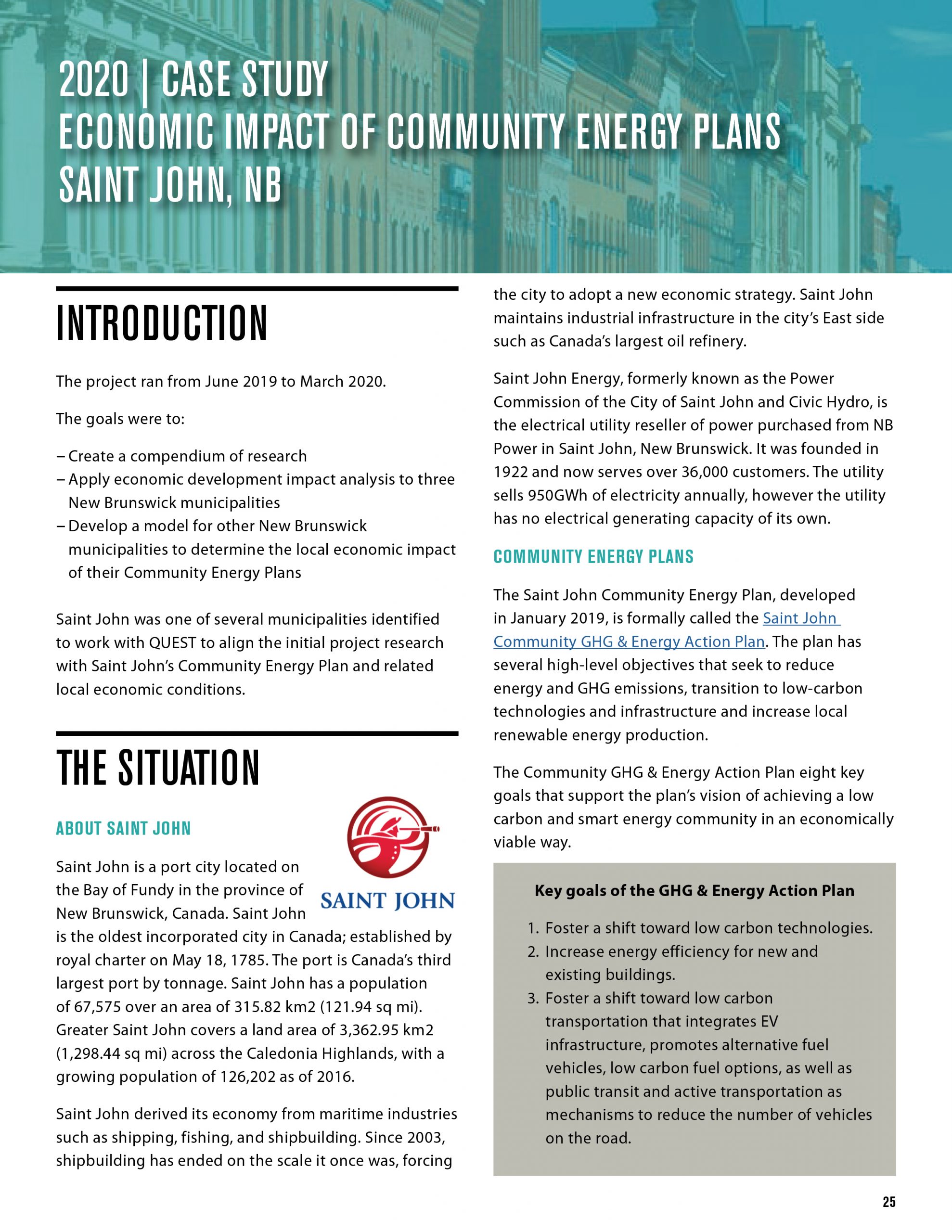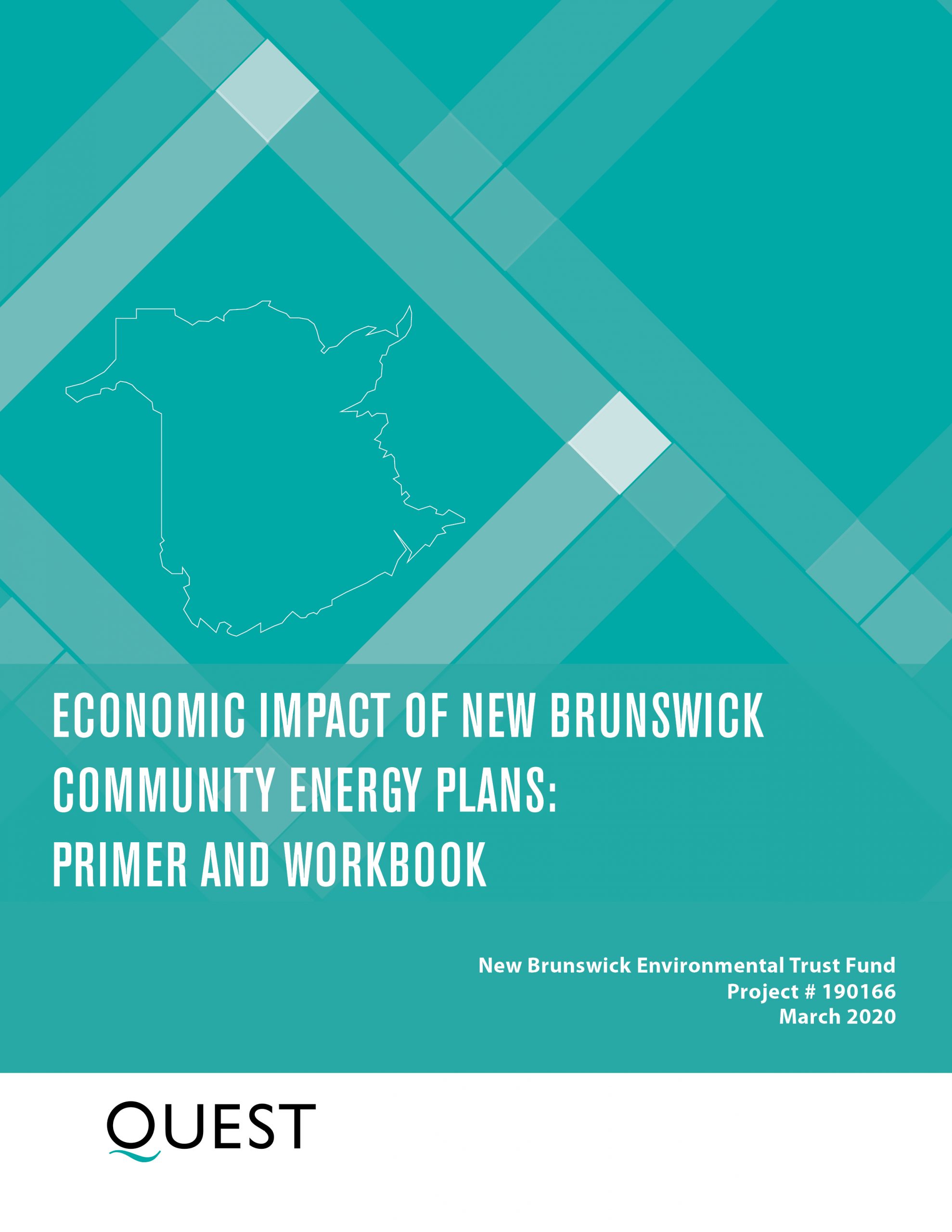Economic Impact of New Brunswick Community Energy Plans
The project
Issue
Accounting for 59% of energy consumption and over 56% of greenhouse gas (GHG) emissions in Atlantic Canada, communities are central and actively working to enable the Province of New Brunswick to achieve its energy and GHG emissions reduction objectives. Though communities are developing Community Energy and Emissions Reductions Plans or Community Energy Plans (hereafter collectively referred to as CEPs) to improve local energy efficiency and reduce GHG emissions, there is limited support for enabling the implementation of those plans.
CEPs are often developed under the leadership of municipalities. However, the goals of these plans are often community-wide, with many stakeholders.
Many municipalities are challenged in maintaining this leadership role as they:
- Don’t see energy as the purview of local
- Are not aware of the changes in energy markets and technologies that bring local benefits
- Are not aware of how this fits with their traditional economic development role in attracting investment and job creation
Project Goal
This project, ran from June 2019 to March 2020, aimed at articulating the local economic benefits of implementing CEPs with the goal of improving the understood value of implementing CEPs among municipalities and their stakeholders.
Objectives
- Develop a communication package for local governments that describes and demonstrates the positive local economic impact of implementing CEPs
- Communicate content to local government
- Clarify the economic development role of municipalities in supporting CEPs
- Increase buy-in to CEP implementation
Case studies
The goals were to:
- Create a compendium of research
- Apply economic development impact analysis to three New Brunswick municipalities
- Develop a model for other New Brunswick municipalities to determine the local economic impact of their Community Energy Plans
Sussex and Saint John were ones of several municipalities identified to work with QUEST to align the initial project research with Saint John’s Community Energy Plan and related local economic conditions.
Workbook
This Workbook is the result of previous work by municipalities that have completed some form of community energy plan and have made substantial efforts to establish a baseline of energy use and GHG emissions across their communities. Further, these communities have established targets to reduce their community-wide energy use and GHG emissions thus allowing for the qualitative and quantitative estimates of the local economic impact of achieving these targets.
This Workbook is the outcome of three main activities previously conducted under the auspices of the overall project:
- A compendium of research that:
- Supports a definition and description of the “transitioning energy economy”
- Macro level economic impact from technologies, systems and organizations that are related to implementing CEP’s that seek to capitalize on the benefits of the “transitioning energy economy”
- A summary of the economic models that are used to determine and calculate the economic impact of implementing CEPs
- Case studies of two selected communities – their quantified energy and emissions profiles, target strategies and resulting economic impact
- Key indicators that all New Brunswick municipalities can use to calculate and estimate the economic impact of their CEPs
Webinar recording
Rob Kerr, senior associate at QUEST, held a webinar on July 15th, 2020 to review the results of this work with the aim of improving understanding of the value proposition for implementing CEPs among municipalities and their stakeholders.
The webinar:
- Describes, defines and discusses the scale of the “Transitioning Energy Economy” and how it presents an economic opportunity for local governments and their communities.
- Provides a description of how jobs are created through the implementation of Community Energy Plans.
- Provides a sample walk-through of estimating job creation potential related to achieving the targets embedded in over 50 New Brunswick Community Energy Plans.
Check out the video below or download the webinar presentation in PDF.
Project Supporters
This project is made possible by support from the New Brunswick Environmental Trust Fund and New Brunswick Power.
Learn about QUEST’s Advisory Services
Other Resources
QUEST conducts and packages cutting edge applied research to empower practitioners and decision makers with the tools they need to advance Smart Energy Communities. Find out more about our projects:
Getting the Most Out of Your Retrofits
With deep retrofit technology readily available, Canadian municipal building stock is in a unique position to impact the country’s climate targets.
Enabling Low-Carbon Energy Projects for Investment
A final report has been developed to help local governments and community borrowers overcome barriers to the low-carbon energy transition.
Enabling Low-Carbon Energy Projects for Investments
Communities in Canada are increasingly developing local, low-carbon energy projects, but many face road-blocks with regards to financing. Simultaneously, Canadian investors are seeking low-carbon investments, but are challenged to find local opportunities at scale for investment. The Enabling Low Carbon Energy Projects for Investment (ELCEPI) research project aims to offer recommendations and solutions to close these financing gaps, while connecting the barriers and enablers for investment to larger socio-economic issues.








